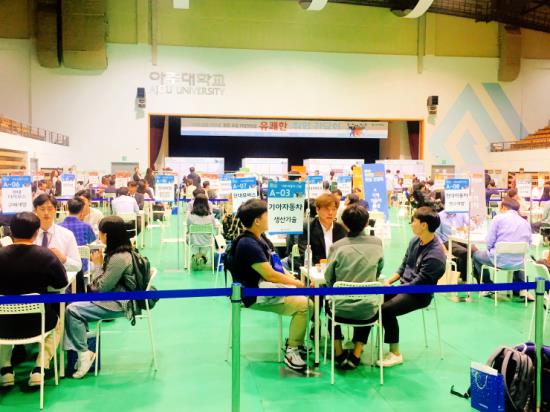- About Ajou
- Admission
- Academics
- Research
-
International
International
- Campus Life
-
News and Event
News and Event
-
AUT
AUT
Ajou News
NEW Ajou University ranks Excellent with a 72% graduate employment rate
- 2020-02-20
- 4084

According to the "Employment Statistics of Graduates of Higher Educational Institutions for 2018," which was announced by the Ministry of Education, 71.6% of Ajou University graduates found jobs, up 3.3% from the previous year.
Ajou graduates’ job retention rate, an indicator of employment quality, also rose 0.4% from a year earlier to 88.9%. Ajou University ranked 4th in the two figures among 58 four-year universities with at least 2,000 graduates.
The average graduate employment rate of the surveyed universities was 64.2%, and Ajou's 71.6% reached 5.6 percentage points higher than the 66% average employment rate of the graduates from top 30 universities in the Joongang Ilbo University Evaluation.
After being designated as the University Job Center in October 2015, Ajou University has been operating a well-organized career and employment coaching system, which includes the One-on-One Consulting Service by Expert Counselors, Meeting with the University Alumni from Diverse Industries, and Hidden Champions Selected by the University Students.
For graduates and students who postponed graduation, Neo Challenge, a customized program consisting of a student capability diagnosis, special lectures, and individual consulting, is also available.
In addition, the University Job Center is functioning as a career consulting hub by opening its programs to young people from the region as well as Ajou students.
Professor Jeong Whon Yu (Director of the University Job Center) said, "We will provide even better services by collaborating with local employment and welfare centers and the Gyeonggi-do Job Foundation," adding, "I hope that young people in our area will find valuable job information from Ajou University's student career development system."
The employment data were compiled as of the end of 2018 and based on a survey of those who graduated in August 2017 and February 2018. For the job retention rate, the Korean government monitored whether those surveyed maintained their health insurance for a year after they were added to corporate health insurance as of the base date.
